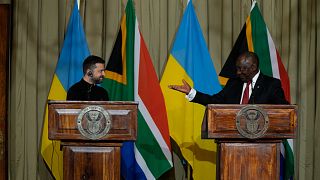South Africa
The South African drug regulator has rejected the Russian-made coronavirus vaccine Sputnik V, citing some safety concerns the manufacturer wasn't able to answer.
The South African Health Products Regulatory Authority, or SAHPRA, said in a statement Tuesday that the request for Sputnik V to be authorized could “not be approved at this time,” referring to past failed HIV vaccines that used a similar technology. But the regulator added that its review process was continuing and that it was still open to receiving any further safety data from the Russian manufacturer.
A late-stage study published in the journal Lancet last year in more than 20,000 participants found that Sputnik V was safe and about 91% effective in preventing people from becoming severely ill with COVID-19.
Sputnik V uses two types of harmless viruses known as adenoviruses to carry the spike protein into the body, which then primes the immune system to produce antibodies against COVID-19. SAHPRA said concerns have been raised about the safety of Adenovirus Type 5, which is used in one of the Sputnik V doses. The other dose contains Adenovirus Type 26, which is also used by Johnson & Johnson.
South African officials pointed to two failed research studies testing an HIV vaccine also using Adenovirus Type 5, which found men who were vaccinated had a higher risk of being infected with HIV. The regulators said they had asked the Russian makers of Sputnik V to provide da-ta proving the vaccine's safety in a country with high rates of HIV but that “the applicant was not able to adequately address (their) request.”
In a statement, the Gamaleya Center, Sputnik V's manufacturer, called the concerns about the vaccine's vector “completely unfounded.” It said speculation about the link between Adenovirus Type 5 and HIV transmission in high-risk populations was based on “small-scale inconclusive studies among volunteers with highly probable risky behavior.” It noted that the same vector was used in China's CanSino vaccine, which has been widely used in China.
Dr. Julian Tang, a virologist at Britain's University of Leicester, was perplexed by the South African decision to reject Sputnik V.
“It's a strange connection to make,” he said, explaining that while past concerns have been raised about using the particular virus vector in Sputnik V, much remains uncertain. “It's not the vector that caused HIV so you can't just blame it on that,” Tang said.
The vaccine made by AstraZeneca uses a related chimpanzee adenovirus; both it and the Johnson & Johnson shot have been approved in South Africa.
Amid widespread vaccine hesitancy in Russia, authorities have struggled to convince people to get vaccinated and the immunization rate in the country has remained stubbornly low, at about 32%, despite availability of Sputnik V.
Sputnik V is currently also being considered for authorization by the World Health Organization and the European Medicines Agency. The shot has been given the green light in more than 70 countries. To date no significant safety problems have been identified.











00:54
Zelenskyy Cuts South Africa Visit Short After Deadly Strikes on Kyiv
Go to video
Iran seeks Russia's support for its nuclear talks with US
Go to video
South Africa's tax row heads to court as implementation date nears
01:02
WHO member countries draft landmark preparedness treaty for next pandemic
Go to video
South Africa appoints Mcebisi Jonas as special US envoy in bid to ease tensions
Go to video
Mauritius: Ex-finance minister released on bail after corruption charges